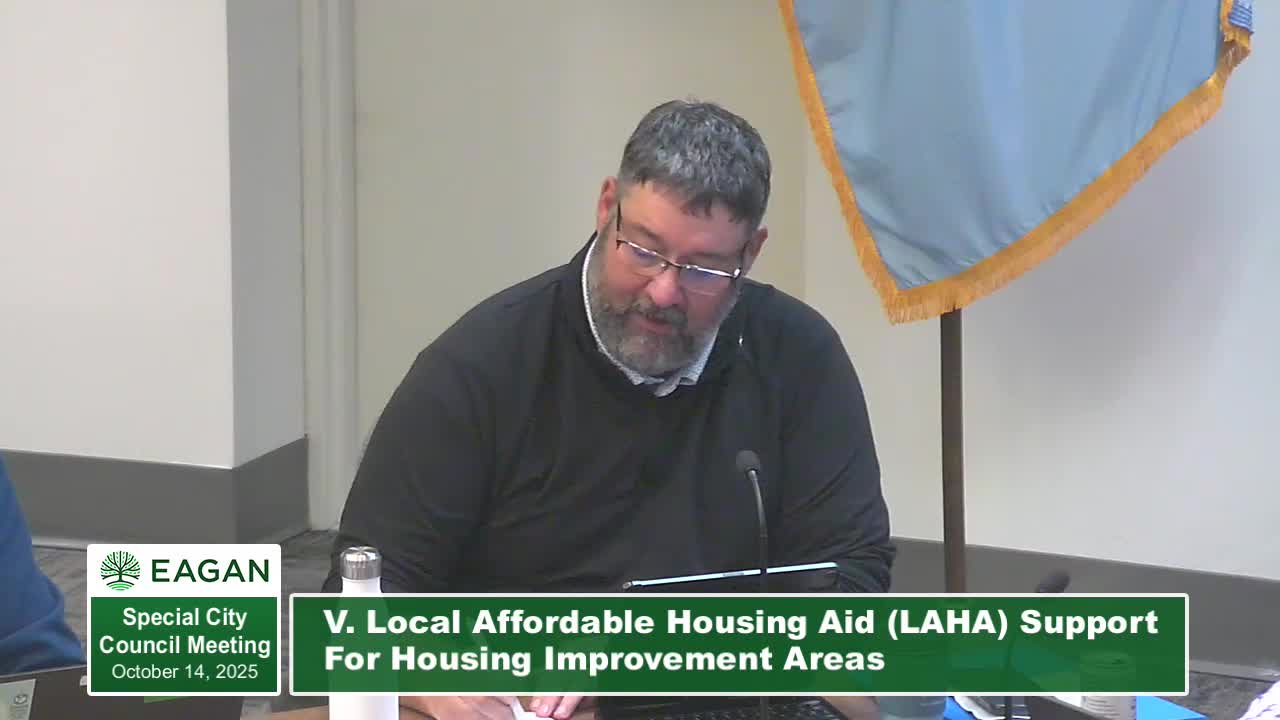LAHA funding eyed to help Widgeon Woods townhome owners after major construction cost overrun; city staff propose targeted deferred-loan assistance
Get AI-powered insights, summaries, and transcripts
Subscribe
Summary
City staff told the Eagan City Council on Oct. 14 they will propose using Local Affordable Housing Aid (LAHA) funds to provide targeted, income-qualified relief for homeowners at the Widgeon Woods townhome development after contractors uncovered extensive rot and structural damage that increased project costs.
City staff told the Eagan City Council on Oct. 14 they will propose using Local Affordable Housing Aid (LAHA) funds to provide targeted, income-qualified relief for homeowners at the Widgeon Woods townhome development, where post-construction work uncovered extensive rot and structural damage and project costs rose far above the original budget.
"LAHA was approved by the state legislature in 2023 and slightly modified in 2024," Economic Development Director Jill Hutmacher told the council. She reminded members that LAHA distributions have statutory constraints, including a commitment window: cities have three years to commit each installment and a fourth year to expend committed funds.
Widgeon Woods (the development at issue) applied in September 2024 for a housing improvement area (HIA) financing package seeking roughly $2.4 million to support common-area siding and deck replacements. The city reviewed the HIA application, scheduled and held required public hearings, and adopted the development agreement earlier in 2025. Construction began after council approval, and contractors uncovered extensive water and structural damage in multiple buildings as siding was removed.
Because state building code requires uncovered structural defects to be remedied during construction, the project scope and price rose substantially; staff estimated the additional work has increased the project cost by as much as 50% in some places. Contractors and the homeowners'led HOA negotiated interim remedies and construction loans, but the HOA said the additional burden created an immediate cash squeeze for homeowners: the HOA set a lump-sum payment (due in early November) of roughly $6,600 per homeowner and two short-term construction loans that add about $600 per month in assessments, according to staff.
Complicating the financing picture, 16 of the development's 33 homeowners made prepayments to extinguish their annual HIA assessment under the earlier scope; staff noted the transcript terminology is ambiguous about whether the $82,500 figure cited was the aggregate prepayment or an individual amount. The council and staff emphasized they would not invent or assume details beyond the record: the transcript shows 16 homeowners prepaid and that other homeowners now face the newly announced lump-sum and construction-loan costs.
City staff proposed three limited LAHA-based assistance tools to help income-qualified homeowners without creating an open-ended bailout or a precedent that would obligate unlimited city support:
- Deferred HIA-fee loan for qualifying households (income up to 115% of area median income). The city would defer the first three years of the HIA assessment until time of sale or until the unit is no longer owner-occupied; the deferral would be recorded on title (no interest during the deferral period). Staff envision using LAHA funds to bridge the city's debt service for the deferred years so the HIA bond payout and cash flow remain intact.
- Additional forgivable/deferred assistance for very low-income homeowners (priority for households at or below 80% AMI). Staff proposed a $5,000 deferred loan filed on title for qualifying households, repaid at sale or change of owner-occupancy; intent is to reduce the immediate lump-sum burden.
- A structured five-year assessment for qualifying prepay households to assist with short-term construction costs: a $5,000, no-interest five-year deferment followed by a five-year repayment plan with interest if not prepaid earlier. The repayment stream would be structured as an assessment on title; owners could prepay to avoid interest.
Staff emphasized these options are intended to be limited, replicable and tied to statutory LAHA priorities (priority for households at or below 80% AMI). Staff also proposed partnering with the Dakota County Community Development Agency (CDA) for income certification and to use CDA's existing tools and methodology for verifying household income.
Several council members pressed staff on precedent, administrative costs and documentation. Council members generally supported a limited, targeted approach. Mayor and council directed staff to proceed with the three proposed LAHA tools and to return program details and implementing documents; they also asked staff to waive up-front city application fees for homeowners for this implementation period and to work with the CDA on income-certification logistics.
Staff noted LAHA statutory constraints: LAHA distributions are to be committed within three years and spent within four years or returned to the state; Jill Hutmacher said Eagan had received about $346,000 in 2024 (partial year) and about $894,648 in 2025, with rough estimates of about $900,000 per year in 2026 and 2027. Staff estimated that, in a worst-case scenario (every eligible homeowner participating), the proposed assistance tools could obligate a portion of LAHA funds (staff estimated on the order of several hundred thousand dollars), but staff also emphasized the number of income-qualified homeowners is likely to be smaller than the worst-case projection.
Separately, staff explained that the city cannot accept early prepayments on HIA annual assessments for all homeowners in a way that would undermine the bond repayment structure: city staff said early prepayment would reduce interest owed to bondholders and create a legal/financial mismatch unless bonds are restructured, which is not feasible on a tight schedule. The city is proceeding with a set-sale resolution for bond issuance to retire the construction loan and fund the HIA; that set-sale resolution was scheduled for council consideration the week after the Oct. 14 workshop, and staff said they will not pay off the construction loan until appropriate lien waivers and completion documents are in place.
Ending: Council asked staff to prepare implementing documents and income-certification workflows, and to return with a LAHA program plan and the revised Widgeon Woods HIA documents for formal action. Staff will coordinate implementation with the Dakota County CDA and the city attorney's office and report back at an upcoming council meeting.
